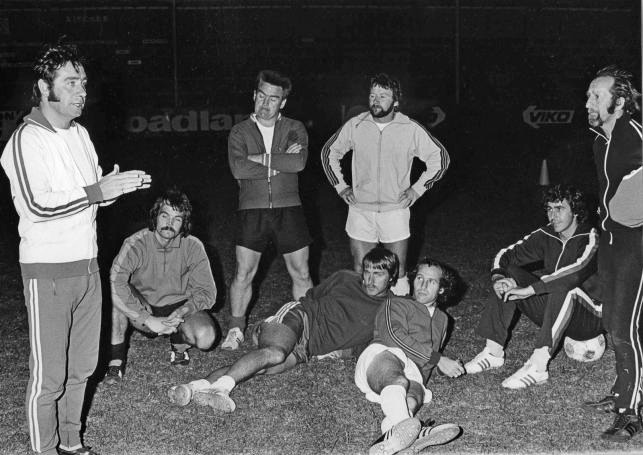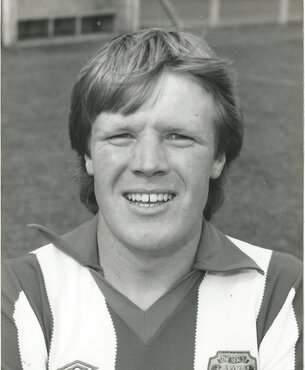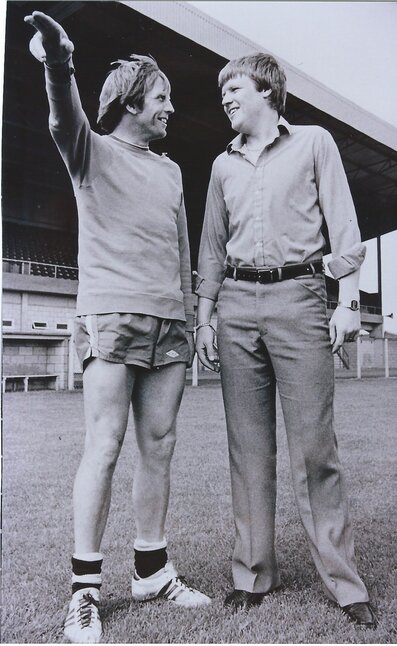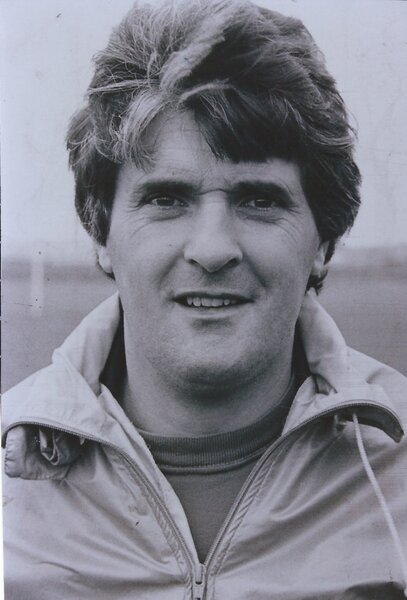A friend was recently telling me about an article he had written for the Prescot Cables programme a few years ago which mentioned a player called Wally Hughes who briefly featured in Chester colours. While his stay at Sealand Road was restricted to three games for the Cheshire County League team he had a fascinating career managing both the New Zealand and Fiji national teams. The following article is reproduced with Roy McDonald’s kind permission and can also be seen on his Tales From Hope Street blog page. It is well worth checking out his other articles which can be found at:
https://roymcdonald.wixsite.com/blog
I researched his ‘career’ at Chester and Wally was signed by Stan Pearson on a one month trial in August 1959 after playing in the Possibles v Probables public trial match. The 25 year old outside right made his first start in the opening Cheshire County League of that season at home to Ellesmere Port Town. It proved to be a memorable debut as, after an uneventful first half, he scored the only goal of the game against the reigning Cheshire County League champions.
Also making his debut for the reserves that day was 17 year old Ron Davies who, of course went on to have a long career with Luton Town, Norwich City, Southampton and Manchester United amongst others and was capped 29 times by Wales.
Wally then played in the 1-1 draw at Bangor City followed by a 4-0 defeat at Northwich Victoria where he switched to the left wing to make way for promising 17 year old youngster Jimmy Cooper. Although he was described as ‘lively’ against Vics it proved to be his last game and he was released in September at the end of his trial.
The following is a reproduction of Roy McDonald’s ‘Cables to Kiwis’ article:
Walter Cyril Joseph Hughes was born in Dingle, Liverpool in 1934. Wally was an extrovert character who began his career on the groundstaff at Liverpool F.C. and, at 18, earned a playing contract. He was signed on professional forms on returning from the Forces shortly after the start of the 1954/55 season, but did not make the progress anticipated. He failed to make an appearance for the first team, and in April 1955 he was given a free transfer.
He became the archetypal journeyman footballer when he moved on to Stockport County where he, again, failed to make the first team squad and drifted on to Winsford United in the Cheshire League. Hughes returned to league football when he joined Sheffield United in early 1956, to become new manager Joe Mercer’s first signing. Injuries meant that within two weeks Wally was promoted to the first team, where he impressed on his debut, creating two goals for the Blades. However, he made just two first team appearances, before he was sent on loan to Midland League side, Wisbech Town in October 1956
In April 1957 he moved to Bradford Park Avenue (20 appearances), and on to Southport in February 1958 (11 appearances), making it seven clubs in three years. After Southport, Hughes continued his nomadic roam around football, returning to Winsford United, then Bangor City and Rhyl, before earning a month’s trial with Crystal Palace in early 1959. In August 1959 he landed at Chester. By the start of the 1960/61 season he was at Earlestown in the Lancashire Combination, and he began the 1961/62 with Prescot Cables – by my reckoning, his fourteenth club in eight seasons.
During these later years, Wally had taken his F.A. coaching badges and worked in coaching clinics for the F.A. and the Liverpool Coaching Association and also worked part-time for Cheshire Education Authority. In December 1961 Harry Topping was sacked as Manager of Cables and Wally was appointed player-coach. It is very likely that Prescot Cables was Wally’s first role in team management.
However, things did not go well for Hughes at Hope Street and within 3 months he, too, was replaced this time, by ex-Cable, Dick Platt.
In February 1962, the Liverpool Echo reported that, “Prescot Cables have released two of their professionals, inside forward and player-coach Wally Hughes and goalkeeper Jack Critchley. Hughes was at one time on Sheffield United’s books and has played in Italy.” [I have, so far, been unable to verify his time in Italy]
Wally went on to play for Cambridgeshire side, St Neots Town in the Metropolitan League before coming back to Merseyside, again, to join New Brighton for the 1963/64 season. Unsurprisingly, his stay with the Rakers didn’t last long and in March 1964 it was reported that his contract had been cancelled.
In 1973, Wally Hughes emigrated to New Zealand, where he took up the role of head coach of Dunedin City in the Southern League. At Dunedin he worked alongside another Prescot old-boy, Alan A’Court and took them to promotion in his first season.
After two seasons he became Director of Coaching for the New Zealand Northern Region and took charge of the Auckland representative side that played visiting teams like Manchester United and Tottenham Hotspur. In late 1976 he was appointed coach of the Kiwi’s national football team, for the 1978 FIFA World Cup qualifying campaign. On his appointment Hughes set his sights high, saying, “We are going to have a different attitude. We have been negative in the past but this time we will be positive and aiming high. My ultimate aim is to reach the last 16 of the competition and that means we have to win the Oceania group qualifying games first”.
Hughes first took charge of the New Zealand side in February 1977, winning six, losing five of his 12 games in charge, with one draw.
However, New Zealand failed to qualify for the 1978 World Cup and after Hughes stepped down from the National team he coached in the New Zealand National league, before taking an appointment with the Al Ahli club in Dubai for 2 years, where he worked closely with the former Leeds United and England manager Don Revie, who was then in charge of the UAE National side. Wally said, “Of course, there were a few problems. There was the language problem for one thing. About 90 per cent of the players don’t speak a word of English. You lose something in imparting your message through an interpreter”. Revie gave Wally a glowing reference, writing, “I have watched him work and worked with him in coaching sessions, and I have no doubt in my mind that he is a very good coach indeed”.
After his stint in UAE he returned briefly to Merseyside, and was offered the chance to coach a Norwegian side. He said, “I am looking for a challenge. That’s what football is all about”. That challenge came when he took charge of the Fiji national side in 1981 for their first entry into the World Cup qualifying campaigns. After opening up with a four goal defeat against New Zealand, they drew 0 – 0 with Indonesia, before defeating Chinese Taipei 2–1. However, that was as good as it got, with crushing away defeats against Australia (10 – 0) and New Zealand (13 – 0) in the space of 48 hours. Hughes resigned after the Australian game, claiming that there was interference from Fiji team management and that he did not have a free hand in team selection, talks and tactics.
“I wouldn’t wish on any coach what I have been through,” he said. He claimed that some of his officials were working against him and that the match against the Socceroos was thrown away with one defender being responsible for letting in at least seven goals. He added that this defender went on a drinking spree with a team official after the drubbing at the hand of the Aussies. New Zealand eventually went on to reach the World Cup finals in 1982 in Spain. Hughes returned to New Zealand to coach at East Coast Bays AFC, Auckland University and Manurewa AFC.

As a coach, Wally Hughes was well regarded by contemporaries for his skills and knowledge of the game and for the standards he set, and is given much credit within New Zealand for laying the groundwork for the national side’s eventual qualification for the World Cup finals.
Wally Hughes died in Auckland, New Zealand in January 2011.




